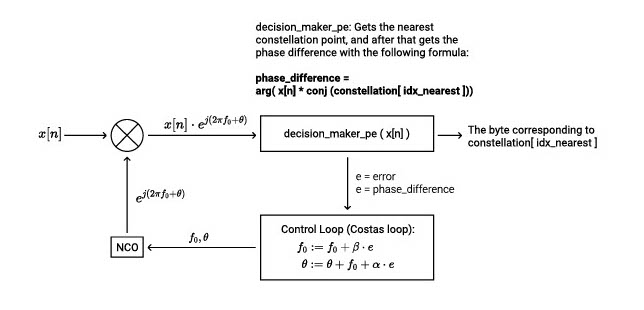Constellation Receiver: Difference between revisions
Jump to navigation
Jump to search
No edit summary |
(add diagram) |
||
| (One intermediate revision by one other user not shown) | |||
| Line 3: | Line 3: | ||
The phase and frequency synchronization are based on a Costas loop that finds the error of the incoming signal point compared to its nearest constellation point. The frequency and phase of the NCO are updated according to this error. | The phase and frequency synchronization are based on a Costas loop that finds the error of the incoming signal point compared to its nearest constellation point. The frequency and phase of the NCO are updated according to this error. | ||
[[File:Const_rcvr_loop.jpg]] | |||
== Parameters == | == Parameters == | ||
; Constellation | |||
: constellation of points for generic modulation, see [[Constellation Object]] | |||
; Loop BW | |||
: Loop bandwidth of the Costas Loop. A good starting point is 2pi/100, or about 0.06. | |||
; Min Freq Deviation | |||
: minimum normalized frequency value the loop can achieve | |||
; Max Freq Deviation | |||
: maximum normalized frequency value the loop can achieve | |||
Latest revision as of 15:56, 4 December 2021
This block makes hard decisions about the received symbols (using a constellation object) and also fine tunes phase synchronization.
The phase and frequency synchronization are based on a Costas loop that finds the error of the incoming signal point compared to its nearest constellation point. The frequency and phase of the NCO are updated according to this error.
Parameters
- Constellation
- constellation of points for generic modulation, see Constellation Object
- Loop BW
- Loop bandwidth of the Costas Loop. A good starting point is 2pi/100, or about 0.06.
- Min Freq Deviation
- minimum normalized frequency value the loop can achieve
- Max Freq Deviation
- maximum normalized frequency value the loop can achieve
